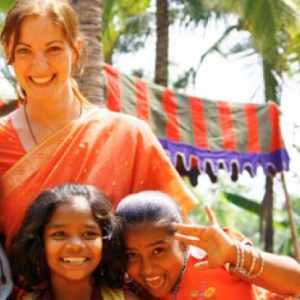At just 21 Jennifer founded Tara.Ed, an NGO which seeks to promote sustainable, quality education in rural, remote and crisis areas of India, Bangladesh and Afghanistan. The organisation provides teacher training, resource mobilisation and infrastructure development– driven by an overarching ideology that teachers are the key to quality education.
In just eight years, Tara.Ed has reached 33 schools and positively impacted the lives of over 17,000 students. And Jennifer’s aspirations stretch far beyond this.
As winner of the 2017 Women’s Agenda Leadership Award in the NFP Sector, we caught up with Jennifer to hear how she’s generated a shared vision through Tara.Ed, and what drives her overwhelming passion to create a greater and fairer world.
How do you feel since winning the Leadership Award for your work with Tara.Ed?
For me, the Women’s Agenda Leadership Awards shines a light on the strong and resilient women whom I work with every day; be they a teacher in a rural Indian school with a class of 68 children who otherwise would not have access to education, a returned refugee in Afghanistan who has taken on the role of a teacher to educate the next generation of leaders and rebuild her broken community, or a child-bride in rural Bangladesh who has fought for an education and is working towards her higher school certificate against all odds. These women are the real heroes of my story – I am simply their advocate.
Tara.Ed cannot do the work it does without support from the wider public and awards such as this can garner attention and support for Tara.Ed’s vision and mission, and help us reach out to support and empower these women.
How does the average day play out for you?
There is no such thing as an ‘average day’ at Tara.Ed – as a grassroots NGO, everyone on the team has quite diverse and wide-ranging roles – this means that every day is different!
For example, last week, I was in Bangladesh running a project at one of our schools, which meant I was in the school, working with the teachers and students during the day, and conducting community consultation meetings in the evenings to ensure that Tara.Ed’s work is driven by the needs of the community (such meetings often take the form of sitting cross-legged on the floor in a mud-brick hut, drinking hot, sugary tea!).
This week, I have been in New Delhi, doing the not so glamorous desk-work associated with running an NGO – replying to emails, writing donor reports, overseeing the accounts and working with my team to put together grant applications.
Next month, I will be in Australia promoting Tara.Ed’s work by speaking at schools and business, meeting the Tara.Ed Board and attending fundraising events to raise money for next year’s project cycle. My role requires lots of travel – I am normally in the field, running projects for about 5 months of the year.
What is your biggest source of inspiration?
Above my desk, I have a photo of one of my students called Shweta* – I call her my conscience. Shweta was still in primary school when I first met her.
Her father had recently died, leaving her mother to bring up three girls on the meagre income she earned selling dried fish in the market. Shweta and her little sister were going to drop out of school, because there was no money to cover school fees, when Tara.Ed offered them both a Star Kids Girls scholarship; allowing them to continue their studies.
Tragedy struck the family four years later, when Shweta’s little sister died from malaria, simply due to lack of access to proper medical care. Shweta completed her high school studies under the Tara.Ed Star Kids Scholarship Scheme, came top of her class in her High school certificate and gained admission to university to study pharmacy and medicine.
She is now in her second year of studies. Her goal is to become a doctor, so she can ensure that other children don’t suffer the same fate as her little sister. Tara.Ed is changing the lives of 17,000 children across India, Bangladesh and Afghanistan just like Shweta, and it is these kids that ultimately keep me going!
What are your big career-goals over the next ten years?
Working in aid and development, I am, essentially trying to work myself out of a job – everything Tara.Ed does aims to eradicate global poverty.
By providing children in the developing world with access to quality education, we hope that we are equipping them with the skills and knowledge to be healthy and productive citizens and escape the cycle of poverty.
This will ensure that their children – the next generation – are not trapped in poverty. I would like to think that we will see a world free of poverty within my lifetime; so, to answer the question – in 10 or 20 years, I hope I am out of a job!
What key attributes make a great leader?
In my opinion, a great leader needs to be able to inspire their team. When everyone is on the same page, has ownership of, and is working towards a shared vision, great things can be achieved.
Why do you think it’s important that women put themselves forward for awards?
It is no secret that, in the workplace, women often have to work longer, harder and smarter, just to be seen in the same league as their male colleagues.
When we do climb to positions of leadership, we are frowned upon for being ‘too aggressive’ or ‘too opinionated’; or for neglecting family or putting our career first.
These awards recognise women in their own right, for the amazing work they are doing – when women stand up and unapologetically acknowledge their own achievements and successes, it creates space for others to do the same. Awards such as these have the power to start a movement and ultimately make massive change.
What big change/s do you wish to see in your industry over the next decade?
If you think of all the aid programs that work in education across the developing world, how many focus on ‘building a school’? I can name multiple organisations just off the top of my head.
But what happens once the school is built and the funding dries up? Who maintains the school building? Who pays the teachers? Many of Tara.Ed’s partner schools are those who have been built by well-meaning NGOs. We work with these schools over a six year period to develop capacity in the teachers, maintain and build infrastructure and develop a sustainability plan, essentially building capacity in our schools to continue on their own, once we have moved on.
The debate is currently focused on access to education – ensuring that children in the developing world have access to school – and this is quite a one-dimensional approach. While access to education is vital; it is only one aspect of development education.
In countries like India, 97% of primary school aged children are enrolled in a school, which means access is not the problem; quality is. A young girl may be enrolled in a school, but can’t attend because she has to stay home to look after their younger siblings, or the school doesn’t have separate girls’ toilets or running water, or there’s no teacher, or she doesn’t speak the language that the curriculum is taught in. We need to move the discussion – and our funding and solutions – away from ‘access to education’ to focus ‘quality of education’.
What would the world look like, if more women led?
I would like to think that we would be one step closer to eradicating global poverty.
What’s the best advice you’ve ever been given?
When Tara.Ed was still in it’s infancy; we hit a few hurdles. My then mentor, Oscar Trimboli, asked me a very simple question: “what does success look like?” and it really threw me! I was so caught up in the small details that I had lost sight of where we were going, and was just making it up as I went along, hoping there would be a decent outcome at the end! Everyone’s picture of success is different, and in order to achieve it, you have to know what it looks like. I have mentored many aspiring NGO start ups since, and this is always the first question I ask.
To learn more about opportunities to volunteer of donate to Tara.Ed, visit the website here.



